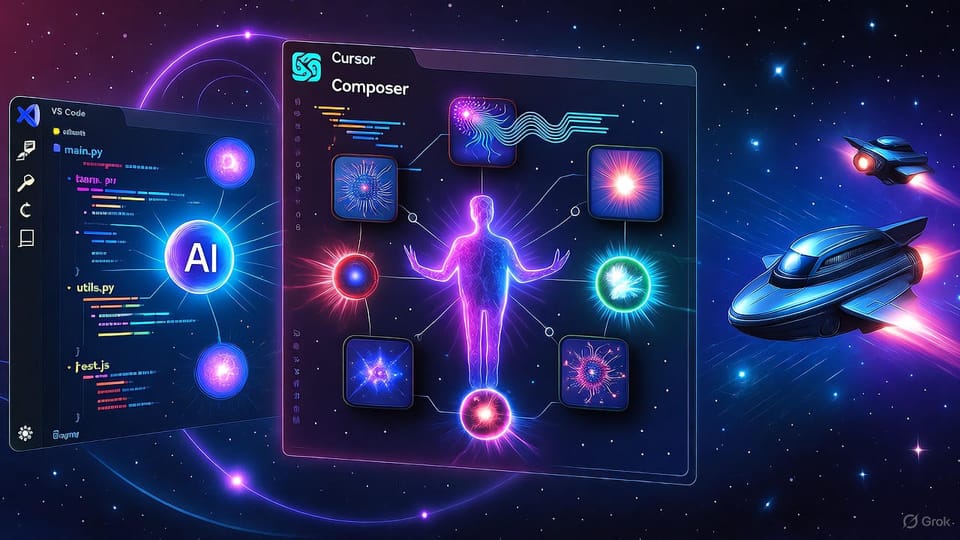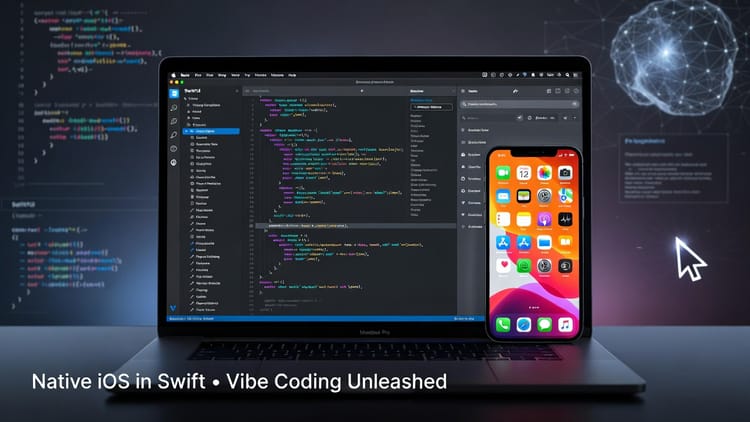Revolutionizing Code Editing: Unpacking the Latest in VS Code Insiders, Cursor 2.0, and Emdash.sh's Parallel Power

Picture this: You're buried in a massive project, tabs multiplying like rabbits on a deadline. One's demanding a quick AI refactor, another's pleading for some multi-agent magic, and the third? It's firing off isolated experiments in Docker without so much as a hiccup. Feels like a developer's fever dream, right? Well, welcome to the wild world of code editing in late 2025, where VS Code Insiders, Cursor 2.0, and emdash.sh are flipping the script on how we build software.
I've spent the last couple of weeks diving headfirst into these updates, and let me tell you—October's been a goldmine. VS Code just unleashed adaptive AI tricks and model-swapping freedom a few days back, Cursor dropped its Composer powerhouse for smarter agent workflows, and emdash.sh cranked up the volume with Docker isolation for running parallel coding sessions. These aren't just shiny bells and whistles; they're the kind of shifts that shave hours off your day and make debugging feel less like pulling teeth.
In this post, I'll break it all down: VS Code's AI evolutions that anticipate your every paste, Cursor's voice-guided agent orchestra, and emdash.sh's knack for juggling multiple code universes in containers. Whether you're grinding through enterprise codebases or tinkering on side projects, I'll throw in practical tips, code bits, and a few analogies (like wrangling caffeinated squirrels). By the time you're done, you'll be ready to swap out your editor and supercharge your next pull request. Let's roll up our sleeves and get into it.
VS Code Insiders: AI Agents Go Adaptive and Open
VS Code Insiders has long been my go-to for peeking into the future of editing—it's like the editor's wild younger sibling, always testing boundaries. The October 2025 releases hit different, though. It's as if the team chugged a pot of coffee and decided to make AI feel less like a bolted-on feature and more like an intuitive sidekick. If you're hanging back on the stable 1.84 branch, you're in for a treat once you make the jump.
Adaptive Paste: Smarter Than Your Last Autocorrect Fail
Dropped on October 27, Adaptive Paste is one of those "why didn't we have this yesterday?" additions. We've all been there: Snagging a snippet from Stack Overflow or a colleague's repo, only to end up with a Frankenstein mess of extra imports, wonky formatting, and lingering debug logs. This feature scans your clipboard against the file you're in—factoring in language, extensions, and even your project's style guide—and smartly cleans it up before it lands.
Breaking it down:
- Context Grab: It taps into your workspace's language servers and active plugins to sketch a quick "paste blueprint."
- Smart Tweaks: Proposes (or auto-runs, if you tweak the settings) fixes like ditching unused packages or syncing to your Prettier config.
- Review and Roll: A handy diff preview lets you green-light, edit, or scrap it.
In practice? Grabbing a React hook example mid-sprint? Adaptive Paste yanks the irrelevant bits, slots it into your Tailwind setup, and boom—no more "undefined is not a function" errors at 2 a.m. Here's how to crank it up in your settings:
// settings.json
{
"editor.adaptivePaste.autoApply": true,
"editor.adaptivePaste.strategies": ["imports", "formatting", "deadCode"]
}
Bonus: It plays nice with the fresh GitHub Copilot CLI hooks in the Agent Sessions panel for instant polishes. Feels like your code's got a built-in proofreader with a dry wit.
Bring Your Own Key: Finally, Model Shopping Spree
A week earlier, on October 22, "Bring Your Own Key" (BYOK) landed, busting open the AI model monopoly. No more being stuck with just Copilot—now you can hook up your own OpenAI, Anthropic, or even a quirky local setup. It's a game-changer for tweaking costs and keeping things private.
The perks at a glance:
- Budget-Friendly: Lean on free local beasts like Llama via Ollama without the API bleed.
- Data Lockdown: Sensitive projects stay off the cloud roulette.
- Mix and Match: Flip between models on the fly—Claude for big-picture designs, GPT for grunt work.
It hooks right into the chat.provider config. Quick example:
// In your .ts file, hit Ctrl+I
// Prompt: "Turn this class into a hook"
// Routes to your key, spits back a clean diff.
Think of it as hot-swapping tires on a rally car—seamless, and suddenly you're lapping the competition.
Copilot Glow-Up: Codex Ties and Agent Dreams
GitHub Universe 2025 gave Copilot some serious Insiders love, like direct OpenAI Codex pulls for richer code gen. Looking ahead, agent roadmaps tease self-driving test scaffolding from your busted runs.
| Feature | The Old Grind | Insiders Upgrade | Real Talk Impact |
|---|---|---|---|
| Model Choices | Copilot Lock-In | BYOK + Codex | Twice the speed on tweaks |
| Agent Handling | CLI Hustle | Built-In Panel | Cuts setup time by 70% |
| Paste Smarts | Blind Copy | AI-Aware | Dodges merge nightmares |
Stacked together, these make Insiders feel like the IDE's finally caught up to how our brains actually work—jumping branches, forking ideas, chasing the next "aha."
Cursor 2.0: Composer Strikes a Chord in Agentic Harmony
If VS Code is your trusty pickup truck, Cursor 2.0 is the souped-up sports car—forked from VS Code but tuned for folks who live and breathe AI-assisted coding. The latest drop, fresh out of the oven, spotlights Composer: a homegrown model that's turning solo coding into a full-band jam session for agents.
Composer: The Speed Demon for Code Symphonies
Composer is Cursor's secret sauce—a coding model laser-focused on zippy outputs you can actually trust. From what I've seen in early runs, what used to drag on for coffee-break lengths now wraps in sips.
How the magic happens:
- Task Breakdown: It slices big asks (say, "Whip up a full auth stack") into bite-sized agent gigs.
- Team Dispatch: Fires off mini-agents for UI, server-side, and QA—each in its own bubble.
- Big Finish: Weaves it all back with editable diffs, highlighting the weird edges.
Try this in Cursor's chat (Ctrl+K):
// Prompt: @composer Build a Node.js API endpoint for user login with JWT, including error handling and rate limiting.
// Gets you scaffold + notes
const express = require('express');
const jwt = require('jsonwebtoken');
const rateLimit = require('express-rate-limit');
const app = express();
const limiter = rateLimit({
windowMs: 15 * 60 * 1000, // 15 minutes
max: 100 // limit each IP to 100 requests
});
app.post('/login', limiter, (req, res) => {
// Auth logic here...
const token = jwt.sign({ userId: user.id }, process.env.JWT_SECRET);
res.json({ token });
});
It's got that effortless vibe—like directing a band where everyone's in tune, no diva moments.
In-App Browser, Voice Input, and Enterprise Edge
Need a web peek? The new in-app browser keeps previews right there—no Alt-Tab tax. Voice mode? Bark your ideas while pacing the kitchen. For bigger teams, secure agent setups keep the suits happy without cramping your style.
| Cursor 2.0 Highlight | Killer Use | Why Bother? |
|---|---|---|
| Composer Model | Heavy Lifts | 3x quicker, less BS |
| In-App Browser | Live Tests | Stays in the zone |
| Voice Input | Brainstorming | Hands-free flow |
| Multi-Agent Dash | Group Hacks | Parallel wins, easy blends |
Emdash.sh: Parallel Coding Agents in Isolated Worktrees—and Now Dockerized
Then there's emdash.sh, the quiet powerhouse for devs who hate linear thinking. It lets you unleash multiple coding agents side-by-side, each tucked into its own Git worktree—like spinning up alternate timelines without the timeline paradoxes. Provider-agnostic (it plays nice with over 10 CLI-based tools like Codex, Claude Code, GitHub Copilot CLI, etc), it's all about local orchestration with a SQLite backend to keep tabs on the chaos. Quick heads-up: While I goofed on the CLI examples in an earlier draft (my bad—emdash is more of a GUI maestro that integrates with CLIs, not one itself), the parallel magic is real and GUI-driven for that seamless flow.
Parallel Execution: Juggling Code Like a Pro
At its core: Fire up agents for divergent experiments—one prototypes a Vue component, another benchmarks DB queries—all in sandboxed worktrees. No shared state means you cherry-pick commits or bail on flops without drama.
Getting started (GUI + CLI prep):
- Install Emdash: On macOS, it's a breeze with
brew install --cask emdash. For Windows/Linux, snag the latest release from GitHub. - Prep Your Agents: Hook up the CLIs it orchestrates—e.g.,
npm install -g @anthropic-ai/claude-codefor Claude, orgh extension install github/gh-copilotfor Copilot. Authenticate as needed (likegh auth login). - Launch and Orchestrate: Open the Emdash app, create a workspace from a ticket (Linear, Jira, or GitHub Issues), add an
agents.mdconfig file outlining your squad, and hit run. It spins parallel agents automatically, feeding them tasks via their underlying CLIs.
Standouts:
- Bubble Wrap: Worktrees ensure pristine isolation.
- Flex Factor: Swap providers mid-stream across 10+ options.
- Ticket Fuel: Auto-pulls issues to kick off workflows.
It's like quantum superposition for coders—explore every branch till you collapse to the winner.
New Docker Beta: Container Chaos, Contained
Fresh from PR #223: The "Docker (Local) — Beta" mode, tuned for Node projects but eyeing broader horizons. Each workspace spins its own container with randomized ports, preflight checks (package.json validation, anyone?), and a tidy UI for connect/stop—perfect for keeping parallel runs reproducible.
Team saver: It nukes "works on my machine" by env-locking per agent, streamlining CI/CD handoffs. Containers as personal vaults—hoard deps, launch ships.
| Emdash Standout | Parallel Punch | Docker Spin |
|---|---|---|
| Multi-Agent Flow | Git Tree Silos | Container Per Spot |
| Provider Flex | 10+ CLI Integrations | Port Roulette/UI |
| Ticket Hooks | Jira/Linear Pulls | Checks + Safe Runs |
Conclusion: Orchestrate Your Code Cosmos
We've geeked out on VS Code Insiders' paste wizardry and model mixology, Cursor 2.0's Composer-led agent jams, and emdash.sh's parallel agents now sealed in Docker for drama-free deploys. The thread? These tools turn solo grinding into a symphony—saving time on the tedium, amplifying the creative sparks.
Quick hits: Adaptive Paste is your merge lifesaver; Composer's pace earns AI street cred; emdash's GUI-orchestrated containers make multiplicity feel mainstream (CLI integrations included, no sweat). Grab VS Code Insiders now, test-drive Cursor 2.0 (pro unlocks the full Composer kit), and install emdash.sh for a weekend experiment.

